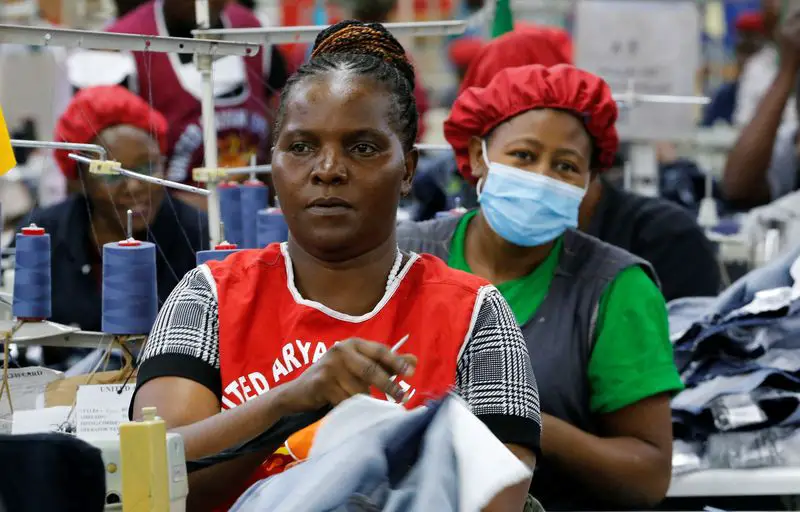Kenya’s Garment Trade at the Mercy of U.S. Congress Amidst Uncertainty Over AGOA Renewal
Norah Nasimiyu, a Kenyan garment worker, understands that the future of Kenya’s garment trade rests in the hands of the U.S. Congress. Having worked in this industry for 13 years and relying on it to support her six children through school and university, she, like many others, is deeply concerned. U.S. officials are currently visiting South Africa to meet with African trade ministers and are facing calls to reauthorize the African Growth and Opportunity Act (AGOA), which is set to expire in 2025.
The AGOA has enjoyed longstanding bipartisan support from lawmakers who consider it crucial in countering China’s dominance. However, dysfunction within the U.S. Capitol and divisions over the need for updates have raised doubts about the Act’s future. This uncertainty has prompted apparel companies and industry insiders to issue warnings about the potential consequences for Africa. If AGOA is not renewed, Africa risks missing out on a significant shift away from Chinese manufacturing, placing approximately 240,000 to 290,000 jobs, such as Nasimiyu’s, in jeopardy.
Nasimiyu expressed her concerns during a break from her work at a Nairobi factory, where she stitches Levi’s jeans. She emphasized the difficulty of finding employment in Kenya and expressed hope that AGOA will be extended. Apparel has been a remarkable success story under AGOA, which was launched in 2000 with the aim of fostering democracy and developing African economies. African apparel exports under the program reached nearly $1.4 billion last year, double the amount before AGOA.
Pankaj Bedi, the chairman of UAL and Nasimiyu’s employer—Kenya’s largest garment producer—credited AGOA’s duty-free access to the largest consumer market in the world as the main reason his company exists. The pandemic and subsequent supply chain disruptions have pushed many companies to reduce their dependence on China, creating an opportunity for Africa to build on its success in the apparel industry. South African Trade Minister Ebrahim Patel highlighted this newfound opportunity and expressed optimism about Africa’s potential to capture a fraction of the business that is shifting away from China.
A July survey conducted by the United States Fashion Industry Association (USFIA) revealed that nearly 80% of companies polled planned to reduce their sourcing from China over the next two years. Stephen Lamar, the CEO of the American Apparel and Footwear Association, confirmed that many of these companies are considering Africa as an alternative sourcing destination. However, the lack of clarity surrounding AGOA’s renewal is already affecting investment decisions. According to the USFIA survey, 45% of respondents have already reduced sourcing from AGOA countries due to renewal uncertainty, while another 45% plan to cut sourcing from the continent if there is no reauthorization by June 2024.
African governments are advocating for a similar reauthorization to the 10-year extension of AGOA approved by Congress in 2015 with bipartisan support. Ideally, they hope for the renewal to be finalized before an anticipated pause on new trade legislation in an election year. However, the likelihood of such a swift reauthorization is increasingly uncertain. The House of Representatives, embroiled in ongoing factional disputes, faces multiple challenges in passing essential legislation. Furthermore, there is a desire to improve AGOA by addressing its major shortcomings as highlighted in a report by the U.S. International Trade Commission (USITC).
This desire for improvement raises concerns among apparel company executives as they fear a similar fate for AGOA as the Generalized System of Preferences (GSP), the largest and oldest U.S. trade preference program. Congress failed to renew GSP before its expiration at the end of 2020, and its reauthorization remains stalled due to disagreements between the House and Senate over eligibility requirement changes. Any attempts to make significant changes to AGOA risk facing a similar gridlock.
If AGOA were to expire, the consequences are clear. The USITC report highlighted the essential role AGOA benefits play in helping countries maintain their apparel exports to the United States. Temporary suspensions of AGOA benefits in the past, such as those imposed on Madagascar in 2009 and Ethiopia last year, resulted in significant job losses. Without AGOA, UAL Chairman Bedi believes that Kenya’s garment industry, along with other companies operating in Africa, will collapse.

